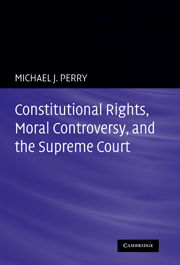Book contents
- Frontmatter
- Contents
- Acknowledgments
- Introduction: A (partial) Theory of Judicial Review
- 1 Human Rights: From Morality to Constitutional Law
- 2 Constitutionally Entrenched Human Rights, the Supreme Court, and Thayerian Deference
- 3 Capital Punishment
- 4 Same-sex Unions
- 5 Abortion
- 6 Thayerian Deference Revisited
- Postscript: Religion as a Basis of Lawmaking? Herein of the Non-establishment of Religion
- Index
1 - Human Rights: From Morality to Constitutional Law
Published online by Cambridge University Press: 05 July 2009
- Frontmatter
- Contents
- Acknowledgments
- Introduction: A (partial) Theory of Judicial Review
- 1 Human Rights: From Morality to Constitutional Law
- 2 Constitutionally Entrenched Human Rights, the Supreme Court, and Thayerian Deference
- 3 Capital Punishment
- 4 Same-sex Unions
- 5 Abortion
- 6 Thayerian Deference Revisited
- Postscript: Religion as a Basis of Lawmaking? Herein of the Non-establishment of Religion
- Index
Summary
My aim in this chapter is to provide some conceptual and normative background and context for the rest of the book. I do so by addressing three questions: What is the morality of human rights; that is, what is the morality that grounds the law of human rights? How does the morality of human rights ground the law of human rights? Why do most liberal democracies – including the United States – entrench some human rights laws in their constitutions?
The morality of human rights
Although the morality of human rights is only one morality among many, it has become the dominant morality of our time; indeed, unlike any morality before it, the morality of human rights has become a truly global morality. (Relatedly, the language of human rights has become the moral lingua franca.) Nonetheless, the morality of human rights is not well understood. What does the morality of human rights hold?
The International Bill of Rights, as it is informally known, consists of three documents: the Universal Declaration of Human Rights, the International Covenant on Civil and Political Rights, and the International Covenant on Economic, Social, and Cultural Rights. The Universal Declaration refers, in its preamble, to “the inherent dignity … of all members of the human family” and states, in Article 1, that “[a]ll members of the human family are born free and equal in dignity and rights … and should act towards one another in a spirit of brotherhood.”
- Type
- Chapter
- Information
- Publisher: Cambridge University PressPrint publication year: 2008



